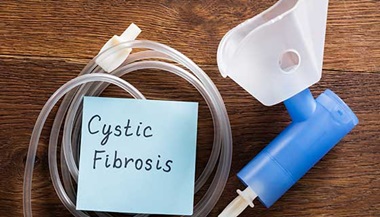Patient Story
Cystic Fibrosis: Sam's Story

Patient Story Highlights
- Sam, a 14-year-old with cystic fibrosis, became the first patient at Johns Hopkins All Children’s Hospital to take Trikafta, a new drug therapy that will help an estimated 90% of cystic fibrosis patients.
- Sam participated in an international clinical trial of one of the combination therapy medications, and while taking the study medication, his appetite improved, as did his energy level and growth, and he had no worsening of his respiratory symptoms.
- Sam will now have the opportunity to see if Trikafta will be more effective than what he was receiving.
Sam treats this as just another day at the clinic, but he holds in his hands a medical breakthrough.
The 14-year-old from Sarasota has cystic fibrosis, a genetic disease that can cause persistent lung infections and limits the ability to breathe over time. This week, he became the first patient at Johns Hopkins All Children’s Hospital to take Trikafta, a new drug therapy that will help an estimated 90% of cystic fibrosis patients. The U.S. Food and Drug Administration (FDA) announced last week approval of Trikafta for patients 12 and older.
“It’s a big deal that there’s finally something that can reach patients with this mutation,” says Sam’s mother, Lisa.
“This is definitely expected to be a life-changing medication for the majority of my patients,” says Deanna Green, M.D., M.H.S., medical director of the nationally accredited Cystic Fibrosis (CF) Care Center and the CF Therapeutic Development Center at Johns Hopkins All Children’s Hospital in St. Petersburg, Florida. “We have a center of 165 patients, and of those, more than 80 are over the age of 12 and about 70 would qualify based on the type of CF mutation they have.”
Cystic fibrosis affects the body by producing thick mucus in varying organ systems which can cause chronic sinus tract infections, respiratory infections, malabsorption disorders, increased metabolic demand, pancreatic dysfunction and potential sterility in males. There are more than 2,100 known genetic mutations that cause CF, with the most common being F508del.
Trikafta is a combination of three drugs that target the defective protein, treating the underlying cause of the disease rather than just symptoms. The drug helps the protein function more effectively, improving the performance of the patient’s lungs, pancreas and multiple other organs in the body. Sam will take it twice a day.
The Johns Hopkins All Children’s program is nationally accredited by the Cystic Fibrosis Foundation as a Cystic Fibrosis Care Center. The program is also a Cystic Fibrosis Foundation-designated Therapeutic Development Center and specializes in clinical trials to evaluate the safety and efficacy of new therapies.
Nearly a year and a half ago, Green and Diana Hodge, R.N., a clinical research coordinator at the hospital, offered Sam’s family the opportunity for him to participate in an international clinical trial of one of the combination therapy medications (not the exact combination that became Trikafta). After carefully considering the potential risks and benefits and discussing it with her son, Lisa and her husband enrolled Sam in the trial. In Sam’s case, lung impairment from CF so far had been minimal, but while taking the study medication, his appetite improved, as did his energy level and growth. He additionally has had no worsening of his respiratory symptoms.
As an active center for multiple clinical trials in CF, Johns Hopkins All Children’s was a participating center in a clinical trial program run by Vertex Pharmaceuticals and overseen by the FDA that tested multiple combination therapies to find a therapy to be effective for the majority of patients. Although the version Sam was being tested on at Johns Hopkins All Children’s also proved effective, the combination that became Trikafta was instead chosen to submit for FDA approval. Sam will now have the opportunity to see if this will be more effective than what he was receiving.
“We have been directly working on this for many years at our center, ever since one of the drugs that now is also one-third of the medication that comprises Trikafta was first studied in 2011,” says Green, who will attend the North American Cystic Fibrosis Conference this week in Nashville. “Our patients are still involved in the long-term safety outcomes that are being studied on this drug for the next two years.”
Michael Boyle, M.D., is an internationally recognized cystic fibrosis expert with Johns Hopkins Medicine in Baltimore and senior vice president of therapeutics development of the Cystic Fibrosis Foundation.
“This is a moment to celebrate and to reflect on how working together, and against great odds, we have effectively transformed a genetic disease in a single generation, making CF the greatest story in medicine,” Boyle says in a recent statement on Trikafta’s approval from the CF Foundation. “As we celebrate today, we also vow to intensify our focus on finding a therapy for every individual in our community who is still waiting for a breakthrough. We will not rest until every person with CF has a treatment for the underlying cause of their disease and, one day, a cure.”
Sam is happy to have been part of the trial and to be as Hodge says, “at the forefront of helping others.”
“We’ve been really blessed that he’s a healthy kid generally,” Lisa says of Sam. “But for a lot of families who are in and out of the hospital, it will be a game-changer. It’s really exciting.”





